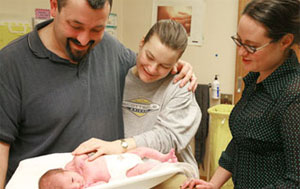Midwife
Tasks & duties

Midwives may do some or all of the following:
-
examine and care for women during their pregnancies
-
provide advice and information to women planning on becoming pregnant and to women when they become pregnant
-
discuss and organise ultrasound and all blood tests during pregnancy
-
provide information and education on pregnancy, birth and parenting for all parents
-
observe, diagnose and treat women during the course of the pregnancy
-
refer to other specialists if medical abnormalities arise during the pregnancy, or during labour and birth
-
care for women during labour and birth, including prescribing medications
-
examine and care for the newborn baby
-
help parents learn how to care for their newborn baby
-
provide care and support with breastfeeding
-
provide health advice about tests and immunisations for newborns, and also contraception
Skills & knowledge

Midwives need to have:
-
good communication, teaching and people skills
-
knowledge of the anatomy and physiology of the body, especially as it relates to pregnancy and birth
-
understanding of the various cultures, beliefs and traditions surrounding pregnancy and childbirth
-
knowledge and understanding of women's health, the different family structures and the range of carers involved in childcare
-
knowledge and understanding of the development of babies
-
diagnostic skills, along with analytical and interpreting skills
-
observation and decision-making skills
-
organisational and time management skills
-
ability to understand and interpret latest research on midwifery and childcare practices
-
knowledge of other support agencies and how to access support services
Though midwives consider that a minimum use of technological intervention is best, the appropriate use of technology is a skill that is important for midwives. They need to keep up to date with technology, and research in order to be able to interpret test results, and ensure that they are providing women and their families with up to date information.
Entry requirements
To become a midwife, you need to complete a Bachelor of Midwifery, a three-year degree programme combining theory and practice. Some courses have an online capability so that students from rural areas can access midwifery education.
New Zealand College of Midwives - for further information
Secondary education
School Certificate or NCEA equivalent is preferred. Useful subjects include English, biology, chemistry and maths.
Training on the job
Midwives must regularly complete first aid and CPR (cardio-pulmonary resuscitation) training.
Under the Health Practitioners Competence Assurance Act (2003), midwives are required to attend workshops, conferences and hui to keep their skills and knowledge up to date.
Many hospitals provide courses for midwives, such as training on emergency procedures.
Registration
To practise as a midwife, you must be registered with the Midwifery Council of New Zealand and hold a current Annual Practising Certificate.
Useful experience
Previous experience in teaching, counselling, nursing or other health-related work is useful, as is being a parent.
Related courses
Midwifery
Sponsors include
New Zealand College of Midwives
For more information, please refer to Career Services.
Document Actions
